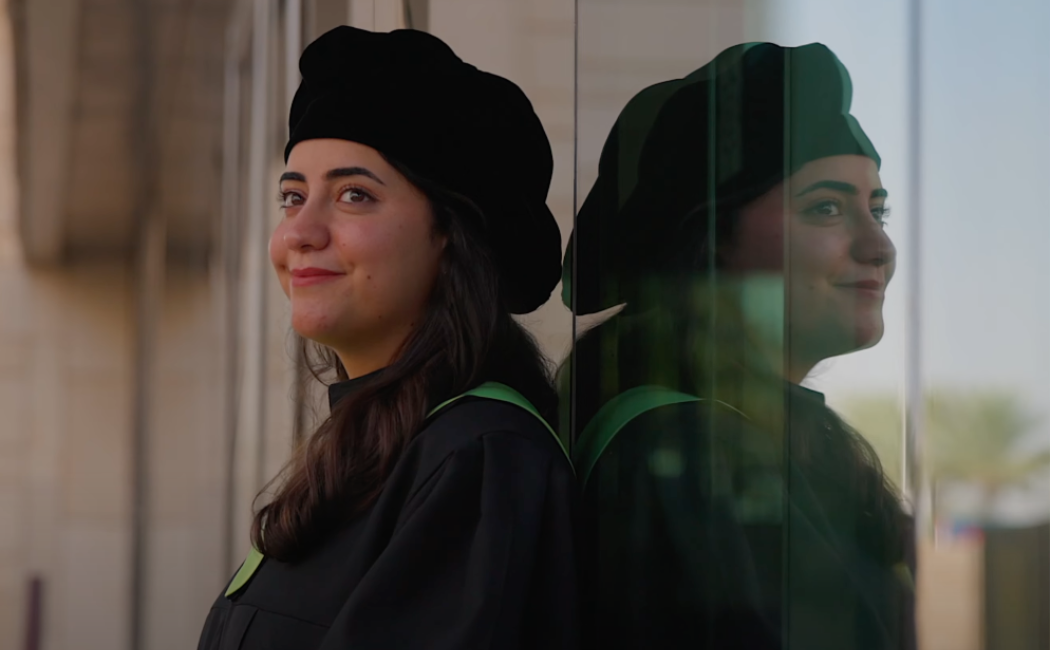
Born and raised in Riyadh, Nadia AlMutlak completed her undergraduate studies at Columbia University in the United States. She arrived at KAUST at the height of the COVID-19 pandemic as a member of the KAUST Gifted Student Program (KGSP), and she has now graduated with a master’s degree in mechanical engineering. Within this broad field of study, AlMutlak’s interest is specifically in robotics. “I’m really interested in studying human-robotic interaction,” she shares, “and looking at how people interact with robots, and why they interact with robots the way that they do.” The goal of this research is for new robots to be designed to interact with humans as efficiently and effectively as possible.
The word robot tends to conjure a very specific image in the mind, but AlMutlak explains that a robot is “any system that you can interact with.” The classic example is the humanoid robot, but the term can also include robotic arms, drones and even computer interfaces; “all of these are considered robotic systems,” she says. Understanding and streamlining human interaction with robotic systems, therefore, is not just a question of engineering; “it also [involves] a lot of neuroscience behavioral research and human-centered design.”
AlMutlak’s interest in robotics began when she was a child. She recalls spending time with her aging grandfather and trying to find ways to mitigate the daily challenges he faced. “I would help him with his medication,” she remembers, “and I used to see how that was a hassle for him, and I was always looking for hacks and tricks to make that easier.” The devices she designed to assist her grandfather, including “small robots [made from] Lego” formed the basis for her academic pursuits, which brought her to KAUST for the first time at the age of 16 as part of the Saudi Research and Science Institute (SRSI).
The SRSI is a summer program that gives high school students an early glimpse into the world of scientific research. For AlMutlak, it was a chance to see “what a scientist does, and what their day looks like.” The experience was more than enough to entice her down the path of further study at Columbia, with funding and support from the KGSP. She explains that KAUST “didn't just fund [her] education abroad, they also [provided] enrichment experiences throughout the four years of college.” These included conferences and symposia, and an annual gathering of all KGSP students studying in the U.S., to facilitate network-building within the program. AlMutlak recalls that event as being “very, very important to [her] development throughout those four years.”
When she arrived at KAUST in September 2021, AlMutlak felt a little bit resistant to change. Just when she had become settled in New York after moving there from Riyadh, COVID-19 restrictions forced her into isolation, working from a small lab she built at home. “I was very hesitant to get out of my comfort zone and meet new people,” she recalls, “and to change the way that I think about things.” She initially found KAUST to be a small and quiet community compared to the big city life she had always known, but soon found that this allowed for more opportunities to connect with people from different backgrounds and cultures than she could even in New York. She now has a newfound open-mindedness that she hopes to nurture even more as a KAUST alumna.
For AlMutlak, the journey beyond KAUST will begin at Bain and Company, where she is soon to start work as Associate Consultant. She hopes this position will provide opportunities to “learn about strategy development, in order to combine [her] academic knowledge and industrial knowledge,” with a view to one day launching her own robotics startup. Ultimately, her goal is to find robotics solutions that are tailored specifically for Saudi Arabia, taking its rich culture and the needs of its citizens into account. “It would be a really rewarding experience,” she feels, “to interact with something that adapts to you, that understands you.”
Entrepreneurship is something with which AlMutlak is already familiar, having co-founded a promising software company – Tarkeez. Its aim is to help those with Attention Deficit Hyperactivity Disorder (ADHD) to improve their concentration using deep learning. Tarkeez is receiving support from Blossom Accelerator – Saudi Arabia’s first female-focused startup accelerator program – which provides founders access to community, networks, educational resources, as well as curating investment opportunities. Blossom also powers the annual Hackathon at NEOM’s Oxagon, designed to encourage inclusivity and diversity within the innovation landscape.
KAUST has always sought the very best of young talent from within Saudi Arabia, and thanks to the SRSI and the KGSP, another exceptional mind has been unleashed with the tools and skills to change The Kingdom and the world for the better. AlMutlak is grateful for all the support she has received, especially from her supervisor, Professor Eric Feron, who was “a very big supporter of creativity.” His encouragement to explore as many ideas as possible is something AlMutlak intends not to forget. She has graduated at a time when Saudi Arabia is becoming recognized worldwide as a place that embraces new ideas, in particular through Vision 2030, and AlMutlak will now take her place among those who will bring it to fruition.